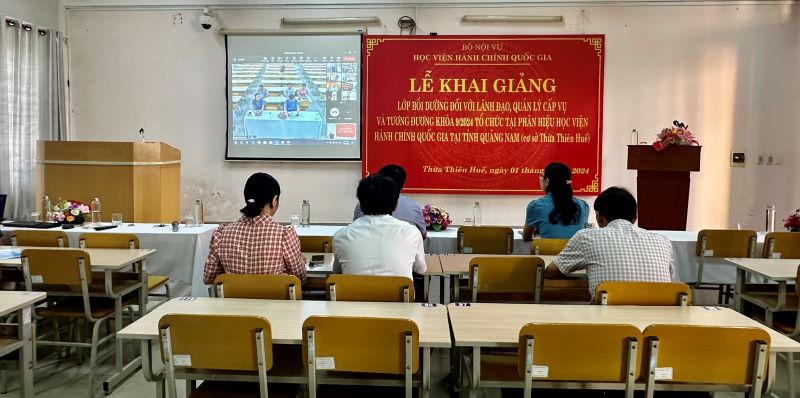On June 1, 2024, in Hue City, the National Academy of Public Administration – Quang Nam Campus (NAPA QNA) held the opening ceremony of the training course for public leaders and managers at the ministerial department level and equivalent, Cohort 9/2024. The course is standardized according to Decision No. 426/QĐ-BNV dated June 2, 2022, of the Minister of Home Affairs, which issues the training programs for public leaders and managers at the ministerial department level and equivalent. The training programs aim to equip, update, and enhance leadership and management knowledge, skills, and international integration knowledge, thus helping public leaders and managers at the ministerial department level meet the requirements and tasks of advising, managing, and operating in public service execution.
Attending the opening ceremony were Assoc. Prof. Dr. Nguyen Hoang Hien, Director of NAPA QNA; representatives of the leaders of NAPA QNA units, and 34 course participants who are public officials from agencies and units in the Central region, specifically from the provinces of Quang Binh, Quang Tri, Da Nang, Quang Nam, Quang Ngai, and Binh Dinh.
The ceremony was held via the Microsoft Teams online system, with participants attending from various online locations.

Ms. Mai Thi Phuong Dung, Head, Division of Refresher Training Management, NAPA QNA, announcing the Decision on the organization of the training course.
After the introduction, Ms. Mai Thi Phuong Dung, Head of the Division of Refresher Training Management, NAPA QNA, announced Decision No. 3503/QĐ-HCQG dated May 30, 2024, by the NAPA Vice President regarding the organization of the Training course for public leaders and managers at the ministerial department level and equivalent, Cohort 9/2024, at the Quang Nam Campus. The course runs from June 1, 2024, to July 7, 2024, with a curriculum comprising 80 periods and 10 topics, divided into two parts as follows:
- Part I: Knowledge includes 3 topics aimed at updating and supplementing knowledge about the duties and powers of ministerial department-level leaders and managers; necessary knowledge for integration and working in an international environment; state management in a socialist-oriented market economy; and 1 thematic report.
- Part II: Skills consists of 5 skill-based topics related to the duties and powers of ministerial department-level leaders and managers, thereby developing leadership and management skills and job execution skills to better serve the needs of citizens and organizations; and 1 thematic report.
The course participants will also attend a practical study and research session and complete an end-of-course assessment test.
In his speech, Assoc. Prof. Dr. Nguyen Hoang Hien, Director of NAPA QNA, emphasized that the purpose of the course is to help the participants be quick and perceptive in grasping and solving problems more quickly and effectively, in line with the positions and titles they hold. He expressed his hope that, after the course, the awareness and capacity of the ministerial department-level leaders and managers would be enhanced, enabling them to perform their assigned tasks well, increase the value of public service, serve the country, and serve the people. Additionally, he requested that the participants prepare well in terms of equipment and Internet connection to participate in the training smoothly without interruption, maintain a high sense of responsibility, actively participate in discussions during the course, and seriously follow the regulations of NAPA and NAPA QNA. He also asked the lecturers and related units at the Campus to closely monitor the class’s learning situation, coordinate the teaching schedule, provide technical support online for the participants, and create a friendly and serious learning environment to achieve the best results.
On behalf of the participants of the training course, Mr. Vo Dinh Thang, Chief Judge of the Thanh Khe District People’s Court, Da Nang City, expressed his deep gratitude to the leadership of NAPA in general and QNA NAPA in particular for organizing the course. He noted that this was not only an opportunity for the participants to meet the conditions and standards for ministerial department-level leadership and management positions but also an occasion for them to be equipped with the necessary leadership, management, and operational knowledge and skills to meet the requirements of their assigned tasks. He also emphasized the importance of solidarity, strictly adhering to the training regulations, and fully participating in the research and study of all topics in the training course to ensure the quality of training as required.






